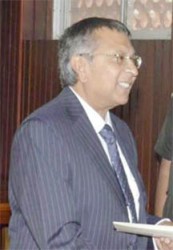The method of judicial appointments must be reformed in keeping with the demands of a modern society, the Guyana Bar Association (GBA) yesterday declared in the wake of the scandal over the disbarment of Justice of Appeal Rabi Sukul in England and Wales.
Disbarred on February 5th, 2014, Justice Sukul quit the local bench after his resignation was asked for by Chancellor of the Judiciary Carl Singh. Critics have said that the constitutional provisions should have been invoked to address Justice Sukul’s circumstances. The matter has also shone

a light on appointments to the judiciary by the Judicial Service Commission (JSC).
In its statement, the GBA said that judicial appointments should be made in conditions of transparency, consultation and due diligence.
“When vacancies arise in the Magistracy and higher courts, they should be advertised so that the widest possible pool of candidates can apply. They must all be fairly considered based on merit. Appropriate agencies and bodies should be consulted before appointments are made.
This is not currently part of the written rules of the JSC, but it should become so along with all other safeguards and measures aimed at transparency and accountability”, the GBA said.
It said that like the rest of the country, the GBA was deeply concerned that a judge of the Court of Appeal, who until his appointment in July last year, practised as a Barrister in the United Kingdom, had been disbarred.
“We acknowledge that the Chancellor of the Judiciary, as Chairman of the Judicial Service Commission (JSC), immediately demanded his resignation. That is not the end of the matter; there are many important questions that ought to be answered”, the GBA contended.
The GBA said that up to the time of Justice Sukul’s appointment, as the principal body representative of lawyers in Guyana, it had not been consulted since the term of Bryn Pollard, S.C. on the JSC ended several years ago.
“We believe then as now that the JSC was not properly constituted. We have raised this matter formally with the National Assembly already.
Further we have complained previously that the JSC makes judicial appointments without any general consultation with the Bar. This should become an entrenched requirement”, the GBA argued.
The GBA said that another matter that had to be addressed was what considerations were brought to bear by the JSC in the process of identifying persons to fill judicial office.
“Was Mr. Sukul shortlisted from a group of candidates for the position of Justice of Appeal? What criteria did the Judicial Service Commission apply to shortlist him? Did the JSC receive or ask for a certificate of standing or similar document from the relevant authorities in England, including the Inns of Court, where Mr. Sukul practised? It would be most unfortunate if the proceedings which ultimately led to Mr. Sukul’s disbarment were pending at the time of his appointment and could have been discovered. Was Mr. Sukul’s application accompanied by any personal or professional references? The authors and contents of this information should be supplied to the public”, the GBA questioned.
The GBA further contended that If there were no pending disciplinary proceedings against Justice Sukul at the time of his appointment to the Bench, the question also had to be asked about when information of those proceedings first reached any member of the JSC and what action was then taken.
The GBA said that inasmuch as there is no express requirement for disclosure, a judicial officer in Justice Sukul’s position should have brought this to the attention of the JSC immediately on being aware of it.
Justice Sukul has not provided information on when he knew of the proceedings. Chancellor of the Judiciary, Singh told Stabroek News that Justice Sukul did not inform the Office of the Chancellor of any outstanding complaint against him. The Chancellor has however declined to answer questions about the due diligence that was done on Justice Sukul. He told reporters last week “…that is a matter that engaged the attention of the Judicial Service Commission and we are not open to discussing the methodologies on how we function”.
The GBA yesterday said that the JSC should answer the questions.
“In our view, public confidence is essential to the effective administration of justice. The constitutional provisions which provide that the JSC affairs should not be enquired into by any court do not mean that this body’s affairs are beyond accountability and scrutiny. Similarly, rule 15 of the Judicial Service Commission Rules, 2010 is not a barrier to making this information available”, the GBA said.
The GBA also addressed the matter of relationships between persons applying for judicial office and those making these appointments. It said that the public should be aware that in many jurisdictions identifying candidates can be an informal or collegial process.
In addition to unsolicited applications, the GBA said that an outstanding lawyer is frequently canvassed to apply for judicial office by the person making the appointment who is familiar with his work and attributes for the job.
“Of course, what the system demands is integrity and sound judgment, which should prevail over acquaintance.
The modern expectation is that interested parties are alert to possibilities of conflicting interests and take appropriate measurers by disclosing same, recusing themselves, etc”, the GBA said.




